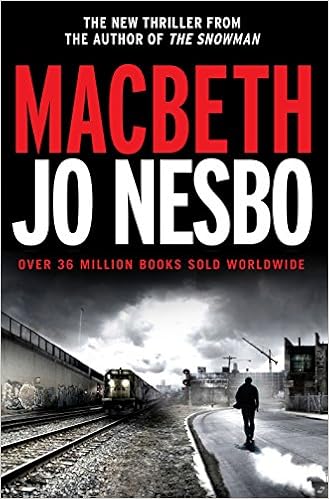 This is the
latest of the Hogarth Shakespeare series which has contemporary authors retelling
the Bard’s plays. I’ve read all of Nesbø’s Harry Hole novels, and in my 30-year career as an English teacher, I
taught Macbeth numerous times. My conclusion: pairing Jo Nesbø with
Shakespeare’s Macbeth was an inspired
choice.
This is the
latest of the Hogarth Shakespeare series which has contemporary authors retelling
the Bard’s plays. I’ve read all of Nesbø’s Harry Hole novels, and in my 30-year career as an English teacher, I
taught Macbeth numerous times. My conclusion: pairing Jo Nesbø with
Shakespeare’s Macbeth was an inspired
choice.
Nesbø sets his crime novel in the 1970s in an economically depressed,
deindustrialized town. Macbeth is the
head of the SWAT team; he answers to Duncan, the newly appointed police
commissioner. Other members of the
police force include Banquo, another member of the SWAT team; Inspector Duff,
head of the Narcotics Unit; and Caithness, head of the Forensics Unit. Duncan
is trying to clean up the corruption that has been rampant in the force and to
take down Hecate, the local drug kingpin. Macbeth’s lover is Lady, a local casino
magnate; she helps convince Macbeth that he should kill Duncan and become the
chief commissioner himself. Anyone
familiar with Shakespeare’s tragedy will be familiar with the rest of the plot
to which this novel remains fairly faithful.
It is
obvious that Nesbø has studied the play quite
closely. For example, in his version, he
incorporates Shakespeare’s clothing imagery (an ambitious man’s shoes always
creak “because he always buys shoes too big for him” and Macbeth’s new uniform “rubbed
against his skin and gave him the shivers”), animal imagery (Lady’s “pupils
twitch, and this reminded him of something.
Frogspawn. A tadpole trying to
break free from a sticky egg”), and blood imagery (Lady has “full red lips” and
“flame-red hair” and “long red nails” and favours red wine and red
dresses). Like Shakespeare, Nesbø uses dramatic irony: Macbeth
says, “You’ll be the death of me, Lady, do you know that?” Pathetic fallacy is used: it is almost always overcast and raining and
sometimes the weather is described as “hellish.” Even soliloquies are adapted; Shakespeare’s
Macbeth describes life as “a tale/Told by an idiot, full of sound and fury,/
Signifying nothing” (V, v, 26-28) and Nesbø’s Macbeth
says, “Perhaps we’re just detached sentences in an eternal chaotic babble in
which everyone talks and no one listens, and our worst premonition finally
turns out to be correct: you are
alone. All alone.”
What is largely
missing is the comic relief found in Shakespeare’s play, though there is a nod
to the Porter’s speech about alcohol
causing “a colourful nose, sleep and pissing” and a humourous nod to
Shakespeare’s dramas in the description of “the expensive national theatre with
its pompous plays, incomprehensible dialogue and megalomaniac kings who die in
the last act”. Nesbø’s Macbeth
is a dark, brutal and bloody saga.
I appreciated that
Nesbø tried to explain some ambiguous statements found in the play. For instance, Lady Macbeth tells her husband,
“I have given suck, and know/How tender ‘tis to love the babe that milks me;/ I
would, while it was smiling in my face,/ Have plucked my nipple from his
boneless gums/ And dashed the brains out” (I, v, 55-59). Nesbø gives an explanation for this
child. He also examines Lady’s
background which helps explain her ambitions for herself and her consort.
There are some
missteps, however. “Brew” is a powerful
drug prepared in a large container by Strega (the Italian word for witch) and her two sisters, too obviously
evoking the three Weird Sisters and a cauldron.
Later, Macbeth is introduced to an even more potent drug than Brew which
Hecate calls “Power.” This metaphor is a
tad heavy-handed. Accepting that Macbeth
would bring home that shoebox and what it contains requires too much suspension
of disbelief. And though Shakespeare
does perhaps suggest a Satanic element to the character of Seyton, Nesbø’s
portrayal is over the top.
It is the portrayal of
Duff which is outstanding. In
Shakespeare’s play, MacDuff is an upright man who acts mostly in the
background. In Nesbø’s prose version, Duff
is more morally ambiguous. He too is
ambitious and has a desire for recognition.
He is also described as a “selfish, arrogant bastard” and “the most
selfish person I’ve ever met.” He
dominates in several scenes; there is even an extended section showing his
escape after the slaughter of his family, a massacre made even more poignant
because of its timing. Duff ends up
serving as Macbeth’s foil: as Macbeth devolves, Duff evolves.
This novel can be read
without the reader having any knowledge of Shakespeare’s play, but a familiarity
with the drama will increase the reader’s appreciation of what Nesbø has
accomplished. He has touched on all the
major themes found in the Bard’s work, and even though I knew what was going to
happen, I still found the book a compelling read.
There have been many
film adaptations of Shakespeare’s Macbeth;
I can well imagine a film version of Nesbø’s novel which is an excellent
example of the crime noir genre.
No comments:
Post a Comment